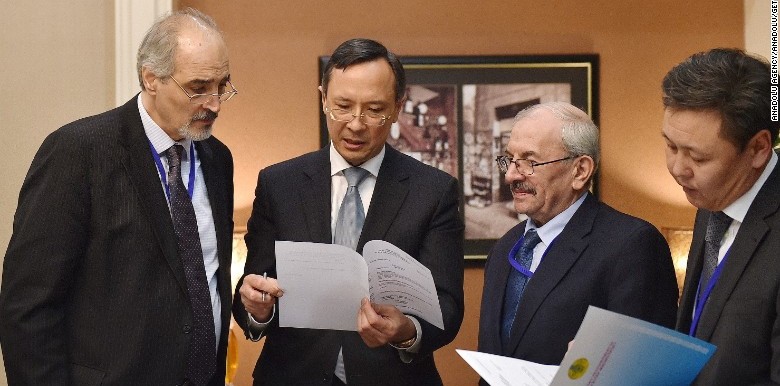PHOTO: Kazakhstan Foreign Minister Kairat Abdrakhmanov second from left with the Assad regime’s representatives, including UN Ambassador Bashar al-Ja’afari, on Sunday
LATEST
- Jabhat Fatah al-Sham Tries to Ease Clashes With Rebel Factions
- White Helmets Volunteer Killed by Regime Strike on Wadi Barada
UPDATE 1125 GMT: The Astana talks have already fallen into acrimony, with the Assad delegation denying the legitimacy of the opposition rebel group.
The regime’s UN Ambassador Bashar Ja’afari called the opposition-rebels a “terrorist group delegation” He said it is characterized by “a departure from tact and diplomacy”, with an “insolent” and “provocative” opening statement from the head of the delegation, Mohammad Alloush.
Ja’afari continued that “this gathering was not organized by Syria” and said the regime is not responsible for the arrangements, i.e., who was invited on the opposition-rebel side.
UPDATE 0815 GMT: The Astana talks have begun.
The opposition-rebel delegation says that it will only discuss a ceasefire, release of detainees, and end to sieges — thus testing Russian and regime adherence — before any consideration of political arrangements.
The head of the delegation, Mohammad Alloush, made clear that “any political transition must start with removing Assad and its regime, and expelling all foreign militias affiliated with Iran from all Syrian lands”.
Alloush added that the opposition-rebel group will not meet directly with the Assad regime’s representatives, and that it does not consider Iran — in contrast to Russia and Turkey — as a guarantor of the agreement.
ORIGINAL ENTRY: Political talks over Syria’s crisis begin today in Kazakhstan, but with little hope of any advance in resolving the six-year conflict.
The Assad regime and Syrian opposition and rebels will send delegations to the discussions brokered by Russia and Turkey. Iran, the regime’s essential ally alongside Moscow, will be present as will UN envoy Staffan de Mistura. The US, sidelined since the autumn by the Russian-Turkish maneuvers, will only have observer status through the American Ambassador to Kazakhstan.
President Assad has already limited the scope of the talks by declaring that he will not accept a transitional governing authority, the centerpiece of international proposals since 2012. The opposition and rebels maintain that Assad must depart through a transitional process.
Opposition-rebel representatives have said that they are attending to test Russian and regime adherence to a ceasefire, release of political prisoners, and end to sieges. However, they do not expect the regime to engage any of these issues, instead tying up the discussions through debate over an agenda and insisting that “terrorism” must be the focus.
Other signals reinforced pessimism over any progress. The regime has not sent any senior figures in its delegation, apart from its UN Ambassador Bashar al-Ja’afari. Kazakhstan’s foreign ministry says it expects the meetings to finish by noon on Tuesday.
The main Russian negotiator at the talks, Alexander Lavrentyev, said it is unclear if the regime and opposition-rebels — led by Mohammad Alloush, a senior official in the rebel faction Jaish al-Islam — will meet face-to-face or communicate via intermediaries.
On Sunday, the regime’s Ja’afari added a put-down on Turkey, which has supported the opposition and rebels since 2011 but pursued a deal with Russia since the summer for de facto partition of northern Syria, a ceasefire, and the political talks.
“Turkey is violating Syrian sovereignty so there is no Syrian-Turkish dialogue,” the Ambassador said.
“Hard Going”
Alexander Musienko, an adviser to the Russian Ambassador to Kazakhstan, told reporters that preparatory talks on Sunday were “hard going ….But one needs to give time to our negotiators to let them complete their mission.
“Undoubtedly one cannot resolve issues like this in just one day,” he added.
A “senior UN Security Council diplomat” was cautious:
The Astana process is a little bit of an unknown quantity, not quite sure what the Russians in particular have got in mind.
But provided that it helps get a genuine UN-led process up and running again….Then it can play a constructive role.
Jabhat Fatah al-Sham Tries to Ease Clashes With Rebel Factions
The jihadists of Jabhat Fatah al-Sham, who have been clashing with rebel factions in northwest Syria, have tried to ease tension by removing protection from an allied group.
JFS, formerly known as Jabhat al-Nusra, said the Jund al-Aqsa group had never actually joined them because JAA’s fighters had not adhered to a vetting procedure for criminals and “extremists” who provoked other factions.
Rebels have blamed Jund al-Aqsa for attacks on their members.
JFS’s move followed a demand from the Shura Scholars Council. However, rebel sources said the leadership of Ahrar al-Sham and other prominent factions are insisting that JFS fight with them against Jund al-Aqsa.
“This step was not enough,” said the sources.
White Helmets Volunteer Killed by Regime Strike on Wadi Barada
Another White Helmets rescuer has been killed by a regime airstrike.
Ahmad Alaya died on Sunday in a regime “double tap” strike targeted rescue workers in the Wadi Barada area.
Hezbollah and regime forces have been attacking Wadi Barada, northwest of Damascus, since December 22 in defiance of a ceasefire brokered by Russia and Turkey.
More than 150 White Helmets volunteers have been slain by pro-Assad attacks since 2013. Many of them have perished in the “double tap” strikes, in which warplanes and/or helicopters return for a second bombing as rescuers tend to victims of the first.

